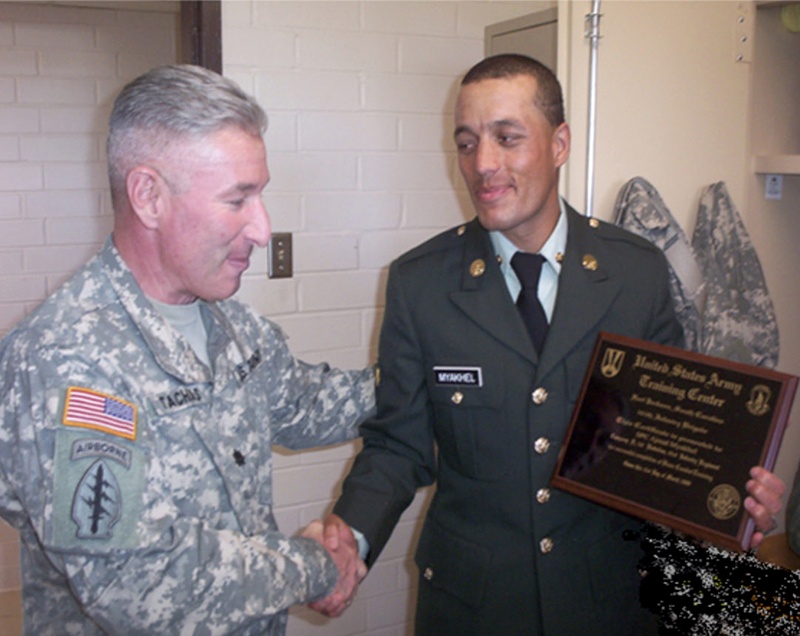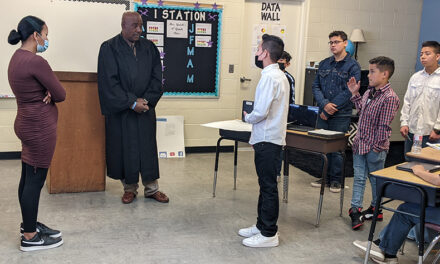
Submitted photo
Retired U.S. Army Lt. Col. Michael Tachias, left, congratulates Ajmal Myakhel, right, on his graduation from boot camp in 2008. Myakhel was one of several Afghan men and women who served as interpreters for Tachias and his soldiers in Afghanistan.
As the world watches the chaos and violence that has come in the wake of the withdrawal of U.S. troops in Afghanistan, a Bosque Farms resident remembers promises he made more than a decade ago.
Retired U.S. Army Lt. Col. Michael Tachias served for more than three decades, saying he was very blessed in his career and met a lot of wonderful people, including Afghan citizens who served as interpreters for him and his troops.
From 2008 to 2010, Tachias — who retired in 2013 — ran the Army’s interpreter program for linguists in Afghanistan and Iraq. He was in charge of everything from training to recruiting to vetting linguists to work with U.S. troops.
“The interpreter program is designed for the military to be able to interact with the locals,” Tachias said. “Everybody thinks everyone there speaks one language, but there’s so many dialects in Afghanistan, such as Pashto, Dari, Uzbek.”
With the need for linguists and interpreters capable of speaking several local dialects, Tachias said, the program began recruiting Afghan citizens.
“Basically, these guys were like our scouts, our intel guys. They told us how things functioned in certain areas, what the threat levels were in places,” he said.
Local interpreters and linguists assisted U.S. troops in the ongoing fight against the Taliban, an extremist Islamic movement that ruled Afghanistan until it was ousted by a U.S. led coalition after the Sept. 11, 2001, attacks on the World Trade Center in New York City and the Pentagon.
“There’s a fear of the Taliban and al-Qaida. That’s why we came, right? I keep in contact with a lot of those people and we made a lot of promises to the Afghans,” he said. “We needed their allegiance, we needed their support.”
Now, with American troops withdrawing, Taliban insurgents have reasserted control in the country, targeting people who helped the soldiers stationed there during the last two decades.
“We’re seeing all these interpreters who were left behind. They put their lives on the line for U.S. troops. We knew, they knew, the threat, and we recruited these guys,” Tachias said. “We made a lot of promises — that we were going to protect them. We need to keep our word. It’s about honor. Otherwise we should have never went there.
“I’ve already heard through the grapevine that some of these guys are already dead. I’m alive today because of those linguists. My soldiers, a lot of them are alive because of them. They are courageous, have integrity and honor.”
Brothers Hasib and Ajmal Myakhel both worked with Tachias as interpreters beginning in their teens. They are both U.S. Army veterans and now live in the states, but have two sisters still in Afghanistan unable to leave.
“One of our sisters, she was an English teacher. She can’t teach anymore, and her husband was a police officer. He got captured by the Taliban and then released,” said Hasib during a phone call with Tachias. “For right now, they’re releasing everybody because all the world is watching them. Once U.S. forces come out, I don’t know what they will do to other people.”
Ajmal said his sisters also served as linguists for American troops, and as relatives of U.S. veterans, he’s concerned they are in even more danger.
“As the immediate family of an American solider, they could be in big danger if the Taliban finds out,” Ajmal said in a phone interview with the News-Bulletin. “They went to the airport but it was so crowded and crazy. Now they are trying to find a way out. As an American solider, I’m very frustrated.”
Tachias said he wants people in America to understand the struggle that’s happening in Afghanistan right now.
“The Taliban, now they are going door-to-door and they’re looking for anybody that supported U.S. troops,” he said. “They are taking kids. It just rattles your whole core. I would love to get on a plane and go right now.”
He can’t get on a plane, but Tachias is reaching out to high-ranking members of the military — generals and admirals he served under — to see if there is a way to expedite getting U.S. allies out of danger quicker.
“Our state department is dragging their tail. I don’t know why. These guys are all vetted, their families were cleared. They served with us. They’re not just somebody off the street,” he said. “We spent over 20 years there and you just can’t get up and just leave in the middle of night … that’s just so wrong.”
Julia M. Dendinger began working at the VCNB in 2006. She covers Valencia County government, Belen Consolidated Schools and the village of Bosque Farms. She is a member of the Society of Professional Journalists Rio Grande chapter’s board of directors.
















